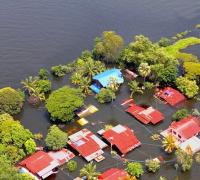The politics of climate change adaptation
As the impacts of droughts, floods and changing rainfall become increasingly clear across the Global South, climate change is emerging as a new arena for broader political struggles over power, authority and territorial control.
For African governments, responses to climate change can provide a convenient means of asserting political control over territories and people that have so far been beyond their reach.
At the same time, climate change provides an opportunity for citizens and local institutions to challenge the authority of the central state and demand improved access to land, water, public finances and political power.
These are among the key points in a new research article in Journal of Development Studies by Mikkel Funder, DIIS, and Professor Imasiku Nyambe and Carol Mweemba, University of Zambia.
The article explores these issues through a study of the politics of climate change adaptation in Zambia, where floods and droughts are becoming a new space for fighting out deep-seated political and institutional struggles over state formation, land control and devolution.
The authors argue that if climate change adaptation is to be done well, we need a better understanding of the political dynamics behind it, and they call for more attention to the domestic politics of climate change in development, and how this influences climate action.
DIIS Experts


